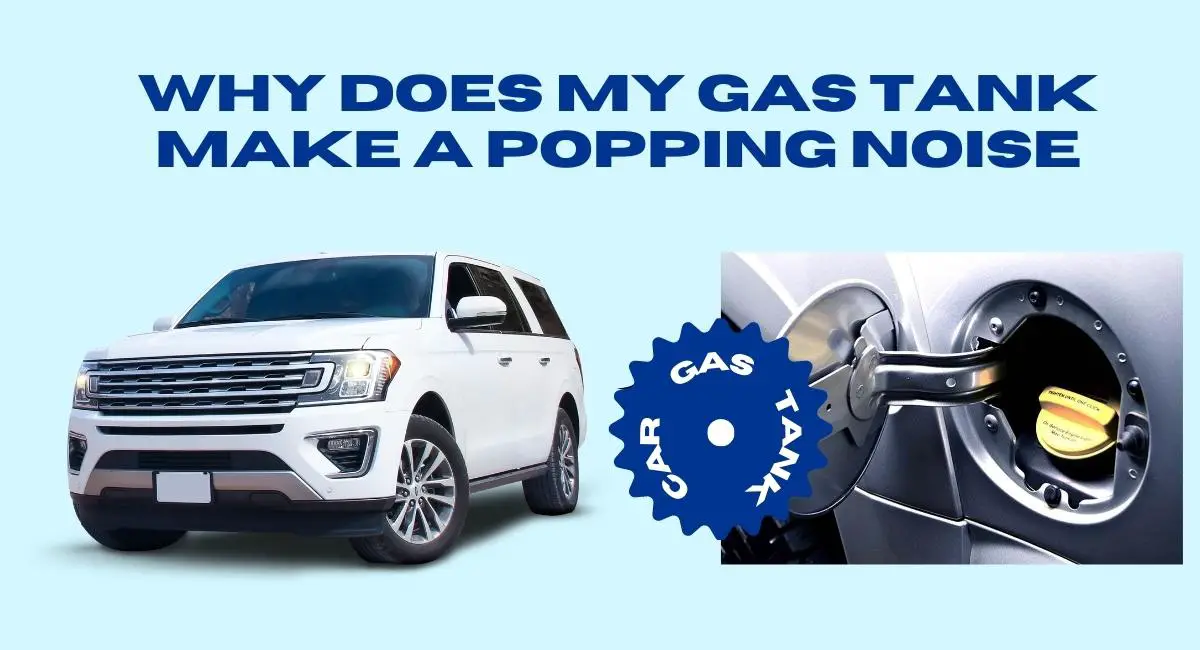While our vehicles are a lifeline for daily commutes, road trips, and late-night drives, ensuring they are operating is essential. Some car owners report a popping sound from their fuel tank, typically occurring within two to four minutes. It resembles the sound of air released from a sealed container, accompanied by a slight popping noise.
The gas tank is a vital vehicle component designed to store fuel. When you start hearing odd sounds from it, it’s natural to be concerned. The gas tank popping noise is due to various issues, including the fuel pump and fuel line issues leaking, water in the gas tank, a buildup of pressure, blockage of the gas tank vent, and temperature changes.
In this article, we will delve into the topic: “Why does my gas tank make a popping noise,” and explore the reasons behind these sounds and what you can do about them. Understanding the noises in your vehicle is crucial for maintaining its health and ensuring a safe driving experience.
Common Reasons Behind Gas Tank Noises
Understanding the reasons behind the gas tank popping noise is not just about easing your worries. It is a critical aspect of car maintenance and safety. A popping sound from the gas tank can range from a benign issue that requires little to no intervention to a loud popping sound in the car that demands immediate attention. Below are invaluable insights into the mystery of the popping gas tank.

Temperature Changes
One common reason behind the popping sound is the expansion and contraction of the gas tank material. Metal and plastic, typical materials for gas tanks, expand in the heat and contract in the cold.
Additionally, the fuel inside the tank reacts to the outside temperature, which can cause changes in pressure inside the tank and result in a popping noise. When the fuel inside the tank heats up, it can expand and release air bubbles, resulting in popping noises.
Evaporation and Vapor Pressure
Gas tanks aren’t just for storing liquid fuel; they collect fuel vapors. When the fuel evaporates, it increases the pressure inside the tank. If there’s a problem with the venting system, pressure changes can cause your gas tank to pop.
Besides, the design of a gas tank allows it to store fuel under controlled pressure. As fuel is consumed and burned, the internal pressure within the tank rises. This increase in pressure occurs due to the vaporization and expansion of the fuel, causing the internal pressure to elevate. To prevent the tank from rupturing, it must relieve excess pressure when it exceeds its intended capacity. It is the point at which the popping noise occurs.
Fuel Pump and Fuel Lines Issues
The fuel pump sends fuel from the tank to the engine, while the fuel lines are the “highways” this fuel travels on. If the pump fails or the fuel lines are blocked, this could cause an unusual noise. In these cases, the noise accompanies performance issues like stalling or difficulty starting the car.
Also, an unsecured fuel line can result in a popping noise originating from the tank when fuel passes through it. The loose fuel line creates an air pocket within the tank, accumulating pressure as the fuel flows alongside it. This increased pressure then manifests as a popping noise.
Structural Issues with the Gas Tank
If your gas tank has dents or is damaged, it may cause popping sounds.
A weakened or damaged gas tank may be unable to withstand the internal pressure caused by fuel vaporization and expansion. As a result, the tank may bulge or deform, leading to popping or creaking sounds as it tries to accommodate the increased pressure.
Plus, various gas tank components, such as the filler neck, cap, or straps, can become loose or faulty over time. When these components are not securely in place, they can create gaps or allow vibrations that generate popping noises when the tank is under pressure.
Knocking and Pinging of the Engine
Sometimes, the noise may not be from the gas tank but from the engine. Pre-ignition, when the fuel in the cylinders ignites too early, can cause a knocking sound. It is often mistaken for gas tank noise.
What causes the knocking noise in my gas tank?
A car gas tank making a knocking sound is similar to a popping sound, but the knocking sound is a more consistent and repetitive noise. Although they might sound similar, the causes can be different, and so can the solutions. Determining the nature and frequency of the sound is critical in assessing its severity.
If a car gas tank is making a knocking sound that resembles something moving or bumping inside your tank, it’s likely due to an imbalance between the air and gas levels within the tank.
The knocking noise in your gas tank can be due to a few possible causes:
- Fuel Cavitation: Cavitation occurs when the fuel in the tank experiences rapid changes in pressure, causing small vapor bubbles to form and collapse. These collapsing bubbles can create a knocking or rattling sound.
- Sediment or Debris: Over time, sediment or debris may accumulate in the gas tank. When the vehicle is in motion or during sudden movements, this sediment can be agitated, resulting in a knocking noise as it moves inside the tank.
- Loose Internal Components: Within the gas tank are various internal components, such as baffles or fuel pumps. If any of these components become loose or damaged, they can move or vibrate, leading to a knocking sound.
- Tank Expansion or Contraction: Temperature changes can cause the gas tank to expand or contract. This expansion or contraction can create a knocking noise as the tank structure adjusts to the temperature fluctuations.
Diagnosing and Addressing a Loud Popping Sound in a Car
Ignoring a loud popping sound can be detrimental. A severely damaged gas tank might leak, posing a fire hazard. An improperly functioning fuel system can impact performance and fuel efficiency. There might be more emissions, and in some cases, the vehicle might fail an emissions test.
It is essential to address the loud popping sound in a car through the following steps:
Initial Assessment and Observation
When you first notice a noise, conducting a basic assessment is wise. Check for visible damages to the gas tank and surrounding components, and monitor the car’s performance.
Consulting the Vehicle’s Manual
Your car’s manual might have information on various noises and what they indicate. It’s always a good idea to consult the manual for preliminary guidance.
When to Seek Professional Help
If you cannot diagnose the issue or if a decline in vehicle performance accompanies the noise, it’s best to seek the help of a professional mechanic.
Possible Repair and Maintenance Solutions
Depending on the diagnosis, the solution might range from replacing a fuel cap to repairing the fuel lines or even replacing the gas tank. Following the advice of a professional is crucial here.
Preventive Measures
To prevent knocking noises from occurring in your gas tank, you can take the following preventive measures:
Maintain a clean fuel system: Regularly inspect and clean your fuel system, including the gas tank, fuel lines, and filters, to prevent the accumulation of debris or sediment that can contribute to knocking noises.
- Use high-quality fuel: Opt for high-quality fuel from reputable sources to minimize the risk of fuel contaminants or impurities that can lead to fuel system issues and knocking noises.
- Properly secure the gas cap: Ensure that the gas cap is tightly secured after refueling to maintain proper pressure within the tank and prevent the entry of foreign substances that could cause disturbances.
- Avoid overfilling the tank: Keep your gas tank within its recommended capacity. Overfilling can lead to excess pressure and potential fuel leakage, which can contribute to knocking noises.
- Regular Vehicle Maintenance. It is the first line of defense. This includes checking the fuel system and ensuring all components are in good shape.
- Proper Fueling Techniques. Ensure you are using the correct fuel for your vehicle, as using the wrong type can cause engine and fuel system issues.
- Seasonal Care for the Gas Tank and Fuel System. Different seasons affect your vehicle. Ensure your gas tank is full in winter to avoid condensation. Avoid overfilling the gas tank.
- Stay Attentive to Changes in the Vehicle’s Sounds. Finally, being observant and attentive to the sounds of your vehicle can be the difference between a small repair and a significant issue. Listen for changes and act accordingly.
Conclusion
In conclusion, there are various reasons why a gas tank might make a popping noise, from temperature changes to issues with the fuel system. Understanding the differences between popping and knocking sounds can help diagnose problems more efficiently. Addressing these noises is crucial for the safety and performance of your vehicle. Regular maintenance, proper fueling techniques, seasonal care, and attentiveness to changes in the vehicle’s sounds can go a long way in preventing issues with your gas tank and ensuring a smooth driving experience.
